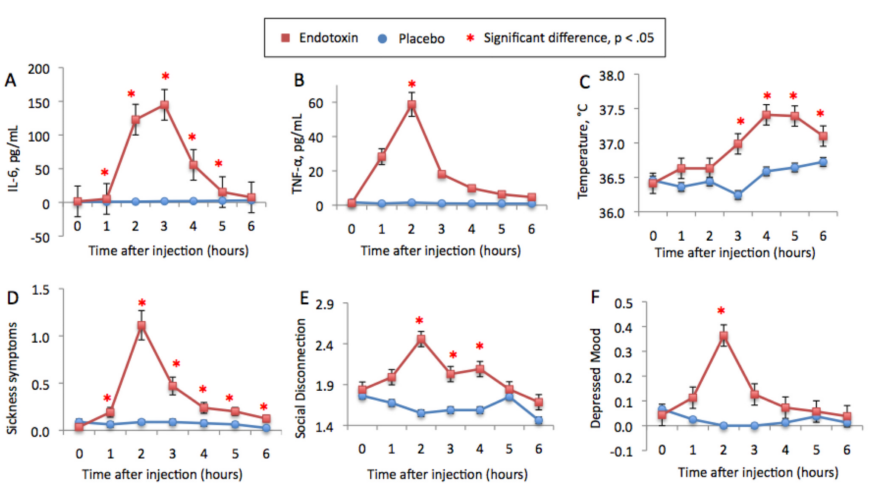It’s well-known that toxin-producing bacteria in food, such as E. coli, can affect your belly — often not for the better — but research by UCLA’s Naomi Eisenberger, Michael Irwin, and others now indicates that food toxins may influence your mood, as well.
In a study in which I am glad I was not a participant, Eisenberger, Inagaki, Marshal, and Irwin (2010) used random assignment to inject 39 healthy participants with an endotoxin derived from Escherichia coli (E. coli group O:113) or a placebo saline solution.
“Wait a minute!” you say, “They injected people with E. coli? The bacterium that causes deadly food poisoning?” Well, not exactly. They injected an endotoxin — a portion of the cell wall of E. coli — into participants’ bloodstream. This endotoxin is not a live bacteria, but the body responds to it as if it is. The method that Eisinberger and colleagues used produced a mild and safe “inflammatory challenge.” This means they caused the body’s immune system to increase inflammation: think swelling, increased body temperature, etc. In other words, this injectionwas annoying, but not deadly.
Interestingly, the endotoxin used in this study was annoying not only physically, but also psychologically. Eisenberger and colleagues observed participants for 6 hours after their injections and found that exposure to the endotoxin — but not exposure to the placebo — increased not only body temperature, heart rate, self-reported sickness, and the release of pro-inflammatory cytokines (proteins in the body that promote inflammation), but also self-reported feelings of social disconnection and depressed mood. Even after controlling for sickness symptoms, the significant increase in feeling socially disconnected remained, indicating that this emotion was not solely the result of feeling sick.
These results are shown in the figure below, taken from Eisenberger and colleagues’ (2010) manuscript. The red line shows the results for the group injected with endotoxin, whereas the blue line shows the results for the group injected with saline solution.
What do these findings mean for you? Strains of E. coli are all around us — in our food, in our bellies, on our plates. Don’t worry too much; most of the time, this E. coli won’t make us severely ill — many strains are mild, harmless, or even beneficial. But the next time you find yourself feeling socially disconnected, a little down, and perhaps a little sick, it might be helpful to pause and to consider whether the blame rests on the mean people around you, or perhaps just the toxins in your last meal. If it’s the latter — rest assured — your bad mood should pass in a few hours.
Note: A big thank you to Dr. Naomi Eisenberger for providing additional information about this study!
